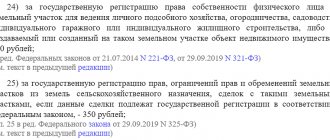A deed of gift for a house, the pros and cons in 2021, which we will consider today, is one of the most common ways of transferring real estate both between relatives and between strangers. However, paying attention to such undoubted positive aspects of the transaction as the speed of registration and cost savings, many are later disappointed in this method of alienation of property, faced with the need to pay taxes, register property rights and some “pitfalls” that arise at different stages.
A practicing lawyer and author of the Legal Ambulance website, Oleg Ustinov, will help you understand how beneficial a deed of gift is for each of the parties.
You can check the relevance of the information provided on the Consultant website.
What is a deed of gift in 2021
From the point of view of the current legislation of the Russian Federation, a gift agreement or a deed of gift for a house is an agreement on the transfer (alienation) of real estate from one party to another free of charge, that is, without any benefit (money, things, services) for the donor of the property.
Today, the wide popularity of this method of transferring property is due to the short period of registration of ownership rights and financial savings. However, in order for the gift agreement not to be ultimately declared invalid, it is necessary to follow certain rules, having information about the “pitfalls” when concluding such a transaction.
For example, the grounds for canceling a deed of gift may include the completion of the transaction in question without the mutual consent of the parties or the presence of any conditions that imply that the current owner of the house receives a certain benefit after the execution of the contract.
Expert opinion
Oleg Ustinov
Practicing lawyer, author of the website “Legal Ambulance”, one of the co-founders of the “Our Future” foundation.
In such cases (if there are reciprocal obligations), according to the laws of the Russian Federation, the parties are obliged to enter into another transaction - an exchange. Otherwise, the legality of the contract can be challenged in court at any time.
Also, as we already mentioned in the article about donating a garage, real estate objects are directly related to the land plots on which they were built. Thus, the deed of gift will be considered invalid if the house is donated without ownership of the land. In this case, the plot of land on which the building (in this case, a house) is built is also subject to re-registration.
From the above we can conclude that:
- Registration of a deed of gift for a house is impossible without transferring into the ownership of the recipient not only the building, but also the plot.
- In some situations, a transaction is concluded with one contract for two objects at once.
For example, even when donating part of a house, the donor is obliged to transfer to the donee a certain part of the land, the size of which is calculated based on the general data of the building and the share.
Let us note that if the donor has a long-term lease on the property and, according to the law, he has the right to use it, he can transfer his right in full to the donee. At the same time, the former owner will continue to act as the owner.
Arbitrage practice
It is difficult to invalidate a deed of gift, but it is quite possible if you present the court with maximum evidence and justify your claims.
This is confirmed by real decisions made by courts in different regions:
- Decision No. 2-4547/2018 2-4547/2018~M-3264/2018 M-3264/2018 dated October 10, 2021 in case No. 2-4547/2018;
- Decision No. 2-1337/2018 2-1337/2018 ~ M-1515/2018 M-1515/2018 dated June 8, 2021 in case No. 2-1337/2018;
- Decision No. 2-94/2017 2-94/2017~M-752/2016 M-752/2016 dated May 16, 2017 in case No. 2-94/2017.
Pros and cons of registering a deed of gift for a house
Like any other legal transaction, a gift agreement, depending on the situation, contains both positive and negative sides. And only after studying all of them, experts recommend that citizens decide whether this real estate transaction is suitable for them or whether it would be better to use another method of transferring it to another person.
Lawyers include the main advantages of deeds of gift::
- There is no obligation to certify the authenticity of documents involved in a transaction with a notary.
- Determination of the conditions and timing of the transfer of the gift into ownership.
- No gift taxation for transactions between relatives.
- The fact that the donee becomes the legal owner of the property immediately after registration of ownership.
- After the official registration of the transaction, the new owner of the property has the right to dispose of it at his own discretion.
- Real estate can be donated during the donor's lifetime, which sometimes avoids conflicts between heirs that often arise when making a will.
- A house received by deed of gift is not part of the jointly acquired property, and therefore will not be divided during a divorce.
ARTICLE RECOMMENDED FOR YOU:
All the pros and cons of a gift agreement with an encumbrance
As a rule, the disadvantages of the deal include::
- An incorrectly drawn up document can be easily challenged in court.
- A gift of a house, unlike, for example, a will, cannot be changed in favor of another person.
- Transactions in which parties are not relatives (strangers and persons not included in this category by law) are subject to income tax, the amount of which in 2021 is 13% of the total value of the transaction.
- Also, there is a list of persons who cannot act as recipients. But, more on that later.
Who can you give a house to?
The owner of a residential premises has the right to give it to any person:
- close relative: mother, father, children, sister, brother, spouse;
- to a third party (acquaintances, friends, etc.).
Note! After signing the deed of gift and registering with Rosreestr, the donor loses ownership rights, so the identity of the donee must be approached as responsibly as possible if you want to continue living in the house in the future.
Donating a house to children as a maternity capital obligation
According to Art. 10 Federal Law dated December 29, 2006 No. 256-FZ, parents who have used funds under the maternity capital program to build or buy a house sign a notarial obligation to allocate shares to all family members, incl. and children.
Shares can be allocated by drawing up an agreement of the same name, or through the execution of a deed of gift.
This must be done within six months after the Pension Fund transfers money to the seller, pays the last installment under the purchase and sale agreement, fully repays the mortgage or settles with the organization that built the housing.
Gift between spouses
According to the law, property purchased during marriage belongs to the spouses in equal shares and is jointly owned without actual separation (50/50). In order for a wife to give a house to her husband, the shares must be allocated by agreement, after which she will be able to draw up a deed of gift for it.
If the real estate belongs to the donor solely on the basis of a marriage contract, shares are not allocated, and the consent of the second spouse is not required.
Property received during marriage by the donor as a gift, inheritance or before marriage belongs only to him. He has the right to give housing to his wife without obtaining her consent.
Important! If the donor intends to give the house to a third party, in the absence of a marriage contract or agreement on the allocation of shares, the consent of the spouse must be obtained.
Donating a house to the state
Donations to state or municipal institutions are allowed, but with some restrictions:
- You cannot make gifts to employees of such organizations if the transaction is related to their official position and the value of the gift exceeds 3,000 rubles;
- if the donor is a legal entity, the transaction is carried out in agreement with other owners, if this is provided for by the terms of the charter.
Legal advice: if the house is planned to be used for socially beneficial purposes, and the role of the donee is a non-profit organization (hospital, school, social institution, etc.), instead of a standard deed of gift, it is better to draw up a donation agreement and indicate exactly how it should be used. If these conditions are not met, the donor will be able to cancel the transaction (Article 582 of the Civil Code of the Russian Federation).
How to draw up a deed of gift for a house in 2021 so that it is not challenged
Before drawing up a donation agreement for a house, you should definitely familiarize yourself with the established procedure for this simple but very important procedure.
- At the first initial stage, the donee must prepare all the necessary documents that confirm his right of ownership of the housing and the land plot on which it is located.
- After this, it is necessary to draw up an agreement, conclude a transaction (sign a deed of gift), and then be sure to officially register the act of transfer of ownership from the donor to the donee.
Remember that in this case, only a transaction executed in writing, but not orally, will be considered legal. The agreement must be drawn up in 3 copies, and it must clearly state the object of the donation and its detailed characteristics (technical data, location, cadastral value, etc.). In addition, the document should indicate the conditions and actual period when the deed of gift comes into force.
It is worth noting that, although, according to the current legislation of the Russian Federation, in 2021 the act of donation may not be certified by a notary, experienced lawyers of the Legal Ambulance website recommend involving a specialist in the procedure. Otherwise, there is a possibility that in the future one of the donor’s heirs will try to cancel the deal.
After the parties have signed the deed of gift, the procedure for registering ownership takes place according to one of the following methods:
- The parties submit the package of necessary documents to the local branch of Rosreestr.
- Papers are sent there by registered mail.
- All files necessary for registration can also be uploaded to the personal account on the official website of Rosreestr.
Features of registering a deed of gift for a house between close relatives
Let us immediately note the fact that the procedure for registering and drawing up a deed of gift for a house between close relatives must take place in accordance with the scheme established by law, subject to the requirements of the Civil Code of the Russian Federation. However, in some cases, the content of the gift agreement in this case may differ from the standard one.
Lawyer's Note
At the same time, according to the results of a survey on our website, relatives rarely draw up a written act at all, basing the gift on a trusting relationship and an oral agreement. Unfortunately, in some cases, this approach leads to quarrels, conflicts and litigation with considerable time and financial costs.
Remember that an indication in the content of the agreement that the deed of gift will come into force only after the death of the donor and the current owner of the donated property leads to the recognition of the transaction as invalid! Such a document will 99.9% be challenged by a court decision.
Sample contracts (Word, .doc)
ARTICLE RECOMMENDED FOR YOU:
Donation agreement after the death of the donor - is gifting possible?
Registration of a gift agreement
After concluding a gift agreement, it is necessary to register it with Rosreestr. You will have to contact the registration authority with pre-prepared documents:
- application for registration;
- gift agreement;
- documents collected for concluding a contract.
An employee of Rosreestr will accept the documents and provide a receipt for their receipt. Documents will be reviewed within 10 days. If everything is properly completed, the recipient receives the property officially.
If the agreement is drawn up incorrectly or an incomplete package of documents is submitted, the registrar will refuse to formalize the transaction. But in this case, the applicant receives a reasoned refusal. When the shortcomings have been eliminated, the application can be resubmitted to the registration authority.
Documents required for registration of deed of gift
Now is the time to consider what documents are needed for a deed of gift for a house. Since the stage of collecting the documentation package is considered one of the most important, we recommend that you carefully study the lists and explanations below, because the absence of just one act or certificate may cause the registration of property rights to be rejected.
Of course, in each individual case, the package of required papers may vary. However, the list still remains unchanged:
- Passports of the parties involved in the transaction.
- A correctly drawn up application for registration of the transfer of ownership of the house, signed by both parties.
- Deed of gift (donation agreement) for a house.
- Documentation confirming the donor's ownership and the legality of his actions in donating this property.
- Papers that confirm the donor's ownership of the land plot on which the house is located.
- If the object of the transaction acts as joint property, you will need to obtain the written consent of your spouse.
For housing that was purchased after marriage, but which is not part of the jointly acquired property, you will also need to provide confirmation, which today, as a rule, is provided by deeds of gift or certificates of inheritance. Also, documents confirming the fact of purchasing a house with personal funds can serve as similar evidence.
However, the best option for you will be to seek a free consultation provided by the lawyers of our website! After all, only an experienced specialist can accurately indicate which papers will be needed in your case.
In 2021, in order to confirm your ownership of a house, the following documents are used:
- Home Book;
- a certificate confirming that there has been no refusal to transfer the property;
- technical passport of the house;
- other documentation that can confirm that the house and the land under it are the property of the donor.
As we already mentioned at the beginning of the article, according to the current legislation of the Russian Federation, the donor can dispose of a land plot only if this plot is his property. Moreover, if the plot is inherited for life or is in use, the donor does not have the right to dispose of it.
It is worth noting that for the donation of land plots, the legislation provides for its own package of documentation, the absence of part of which may nullify the donation agreement. This list includes:
- cadastral passport;
- title documents for property;
- certificates according to which the donor has no debt on this land plot;
- technical characteristics of all buildings erected on the territory of this site;
- papers authorizing the alienation;
- plan drawn up by cadastral service specialists.
Also, sometimes the person acting as the donor of the house may need other additional paperwork. This, for example, may be influenced by the marital status of the donors themselves and the age of the recipient. Such documents include:
- a court order confirming the deprivation of parental rights;
- power of attorney;
- consent of the trustee or guardian;
- also, in the case of donating property to a minor, the consent of the guardianship and trusteeship authorities or parents (adopted or relatives - it makes no difference) will be required.
Rules for drawing up paper
When drawing up this document, it is imperative to record items that should contain the following information:
- Information about the parties. In the first paragraph, you need to identify the parties who enter into the agreement. For example, the donor, the recipient, any third parties.
- Information about the subject of the donation. In the second paragraph you need to indicate the subject of this agreement. Indicate the cadastral number, immovable objects that are located on the land being donated. For example, private houses, the area of the entire plot as a whole, as well as the purpose of the target type of this very land.
- Price. In the third paragraph, write the price that corresponds to the standard. For example, they write the cost of the allotment indicated in the attached deed.
- Assessment of objects. In point number four, you need to indicate the ratings assigned to certain real estate objects located on this land. For example, there are two one-story houses on the land. In order for everything to be formalized correctly, it is necessary to evaluate each of them and enter the figures into the donation agreement, provided that this property is transferred to the donee along with the land.
- Existing disputes regarding the subject of the deed of gift. In the fifth paragraph, it is necessary to specify all the disputes that currently exist regarding the subject of the donation.
For example, a donor inherited a plot of land and decided to give it to the donee, but a third party appeared who also has rights to this land thanks to the inheritance law. It turns out that a dispute arises between the donor and a third party, which must be recorded in the deed of gift. - Encumbrances. In the next paragraph, number six, all the encumbrances that lie on this land should be spelled out. For example, various easements, transfer of land for rent, land being pledged to a bank, land transferred for temporary use, etc.
- Are there any restrictions? In the seventh paragraph, you need to indicate the restrictions that are imposed on the site regarding its use. We are talking about restrictions that are due to the fact that a technological or sanitary-protective type zone is installed.
Restrictions may also be imposed due to the fact that the entire land or its fragment is on the list of recreational, environmental sites or those that have cultural and historical significance.For example, certain construction or performance of any work may be prohibited on this land.
- Duties of the parties. Point number eight states the obligations that the parties will be required to fulfill. For example, the donor undertakes to donate a plot of land, and the donee must accept it. All this must be officially recorded.
- Final provisions. In the last paragraph, number nine, you need to write down certain final provisions. For example, the moment from which the agreement fully comes into force, the number of copies of this document, the amount that will be spent on paying the costs associated with its execution, as well as a list of integral annexes.
We do not recommend completing the documents yourself. Save time - contact our lawyers by phone:
8 (800) 350-29-87Moscow
When drawing up such documents, many experts advise taking into account all possible scenarios . First of all, you need to provide for the worst options. For example, if the donor, after completing the entire procedure, suddenly wanted to return his land back. The motivation for such an act can be very different, but most often such a citizen claims that at the time of concluding the contract he was misled by the second party.
To avoid such situations, the contract must initially record the results of a psychological examination, which will confirm the legal capacity of all parties.
It would also be useful to state the fact that the agreement was not concluded due to a combination of certain life circumstances of a difficult type.
Further, it is better to point out that this agreement does not constitute a hard bargain. In addition, you can also have the document certified by a notary. This can also play a certain role if the situation turns out unexpectedly.
In addition to complying with the formal conditions of drawing up an agreement, it is also necessary to pay attention to what documents are needed to donate a plot of land or a house.
Features of a deed of gift for a plot for a residential building
A deed of gift for a house between close relatives and strangers must be drawn up in triplicate. The presence of a notary is not mandatory, but an advisory factor that will act as a guarantor of the absence of claims from both parties in the future.
At the same time, in order for the gift agreement to have legal force, it must comply with the rules and regulations established by Russian legislation:
- The act must contain all important information about the building and the land on which it is built.
- Information from the parties' passports must be entered without blots or errors.
- The donee is obliged to express his consent to accept property from the donor.
- The agreement must define the conditions and timing of its entry into force.
- The content must indicate the actual cost of the house and land being transferred.
ARTICLE RECOMMENDED FOR YOU:
Deed of gift and deed of gift - what is the difference
Is notarization required?
Despite the mandatory written form, the signature and seal of a notary will only be required if a share in the property right is alienated.
Cost of notary services when donating a house
If the DD is subject to mandatory notarization, a state fee is paid in accordance with Art. 333.24 Tax Code of the Russian Federation. It is calculated from the cadastral value of the house and land and is 0.5% (not less than 300 and not more than 20,000 rubles).
Calculation example:
A house and a plot of land with a total value of 5 million rubles are donated. The notary fee will be:
5,000,000 x 0.5% = 25,000 rub.
Due to the restrictions established by the Tax Code of the Russian Federation, the maximum amount applied to payment is 20,000 rubles.
If notarization is not necessary, the parties can turn to a notary for their own protection: a deed of gift with his signature is more difficult to challenge.
In this case, the notary fee is paid in accordance with Art. 22.1 “Fundamentals of legislation on notaries” - it depends on the value of the object and the family ties of the donor and the donee:
- Alienation in favor of a relative: child, spouse, mother, father, brother, sister with a real estate value of up to 10 million rubles. 0.2% +3,000. If housing costs from 10 million - 0.1% of the amount over 10,000, plus 23,000.
- Donation to other persons with a value of up to 1 million – 3,000 + 0.4%; from 1 to 10 million – 0.2% + 7,000; from 10 million – 0.1% + 25,000.
The maximum tariff cannot exceed RUB 100,000. If the payment is calculated to be 200,000, the maximum allowable amount is actually transferred.
Deed of gift for a residential building or part thereof
According to the legislation in force in the Russian Federation, residential property can be transferred by its owner to another person in whole or in parts. In jurisprudence, there are examples of donative shares of a residential building, as well as donation agreements for undivided property. In case of transfer of part of the house, certain conditions must be met:
- Make a separate kitchen and bathroom;
- arrange a separate entrance to the donated part of the house;
- provide separate communications, etc.
In addition, when separating part of such a property, the donor will need to undergo an appropriate examination at the BTI, whose specialists must provide an extract containing:
- Determining the possibility or impossibility of dividing the living space.
- Options for this section.
- Estimated cost, as well as a technical plan for redevelopment in case of division.
- Date of construction of the building.
- Plan of the entire housing.
- The actual amount of compensation for the party who received the smaller share (if it is impossible to divide the area into equal shares).
At the same time, in the donation agreement for a part of the house, the donor simply indicates certain rooms that will be donated to the recipient.
Paying tax
Since receiving a plot of land as a gift is, from a legal point of view, income, it is necessary to pay tax on this income - personal income tax (Article 224 of the Tax Code).
The rate of such tax is generally 13% of the established base
for residents and 30% for non-residents of the Russian Federation.
Close relatives do not pay this tax (Article 217 of the Tax Code). Close relatives include blood, legal and adoptive relatives. The list of such relatives is given in Art. 34 SK. Such relatives include spouses, grandparents and grandchildren, brothers and sisters (including half-siblings, that is, those who have only one parent in common).
This category of relatives also includes adopted children and adoptive parents.
When paying personal income tax, you must submit the following documents to the inspectorate:
- Deed of gift.
- Cadastral passport.
- Certificate of ownership.
- Tax return.
The donation agreement must specify the value of the donated plot, but when calculating the tax, the cadastral or market price of this plot is usually taken. The cadastral value of a plot is determined by local authorities based on the average price of plots of land in the area. The market price is determined by analogy with similar plots located in the area.
In this case, the market value may correspond to the cadastral value of the site, or may differ greatly from it. This depends on the condition of the donated plot, its characteristics and quality.
A cadastral passport is an extract from the cadastral register. It provides the main characteristics of the land plot. Based on these characteristics, tax authorities check the correctness of personal income tax calculations.
A certificate of ownership indicates the grantee's right to a given piece of land.
The tax return is prepared by the taxpayer. This declaration indicates the value of the land and the amount of tax that he must pay.
How much does it cost to register a deed of gift for a house in 2021?
It is also worth noting the fact that drawing up a donation agreement for a house, like most legal procedures, involves certain financial expenses. At the same time, having transferred all expenses to the donee, the donor may not pay anything at all, because, in fact, he does not receive any benefits as a result of the transaction.
The total cost of the costs of correctly registering a deed of gift directly depends on the methods of its execution and the individual characteristics of the transaction.
Expert opinion
Oleg Ustinov
Practicing lawyer, author of the website “Legal Ambulance”, one of the co-founders of the “Our Future” foundation.
Thus, in the case of independently drawing up an act, the parties to the contract who are included in the category of relatives will only pay a fee established by the state. The price for registration of a deed of gift by an agency will vary, depending on the region of residence of the parties and the complexity of the situation. However, we remind you that each of our visitors has the opportunity to get a free consultation, which will allow you to save a lot!
Each of these offices has its own price list, which determines the pricing policy for each type of service. Therefore, if you decide to contact an agency, be sure to compare prices in 3-4 companies to choose the best one.
Since during the transaction only the recipient party benefits, it is he who will have to pay for the procedure for registering property rights. To date, the price for this has been set at 1,000 Russian rubles . Remember that without a corresponding receipt for successful payment for this service, employees of the registration authority do not have the right to carry out the operation of transferring ownership of the donated house.
So, in some cases, the best option would be to make a will. More about this in the video:
In addition, the new owner of the donated property will have to pay a fee for the plot and housing (350+2,000 Russian rubles). It is also worth talking about the tax paid.
Price
Executing a gift agreement will require certain costs. If you decide to use the services of a notary, he will set his own prices. A state fee is established, without payment of which the application will not be considered. The fee for registering land ownership is 350 rubles, for registering a house – 2,000 rubles.
Registration of a donation for a residential building with a plot is a simple procedure that does not require a lot of time and a lot of preliminary work. If you prepare the documents in advance and quickly conclude an agreement, the property can be transferred to the recipient within 2 weeks.








